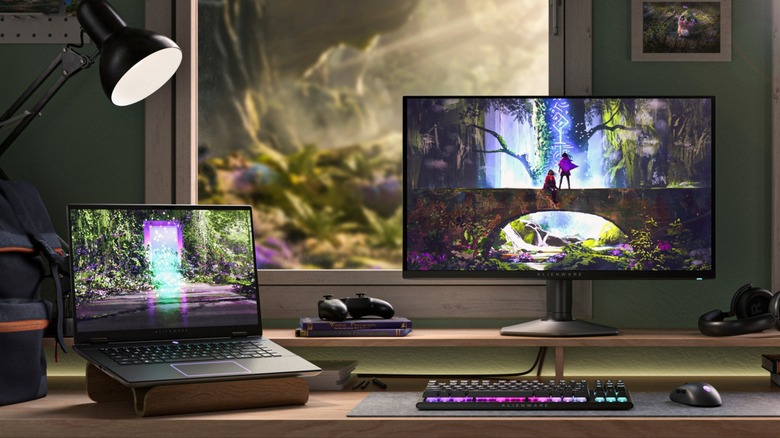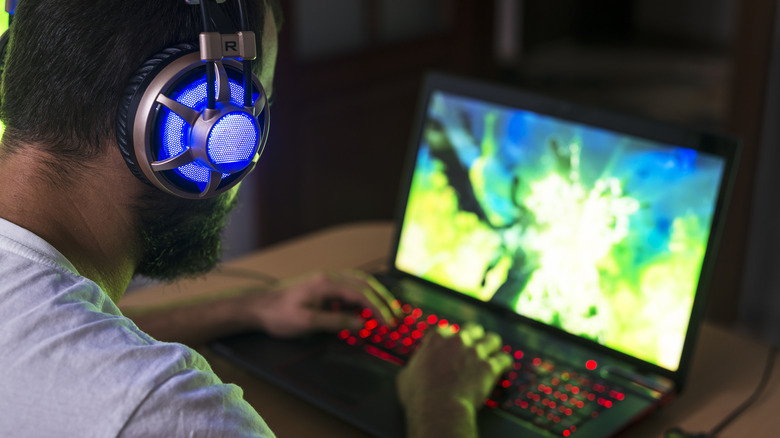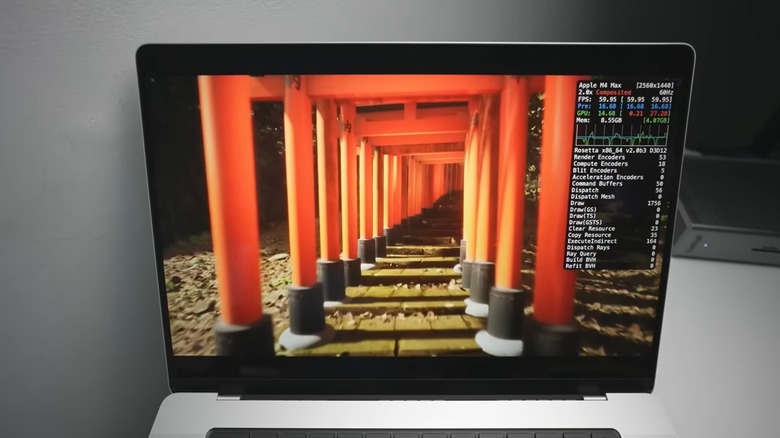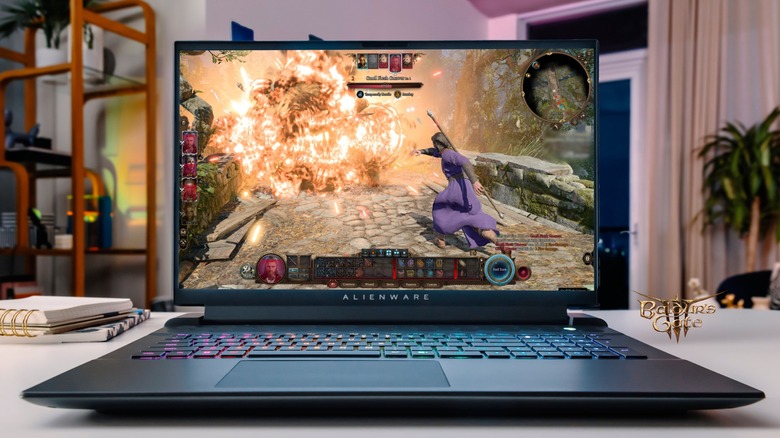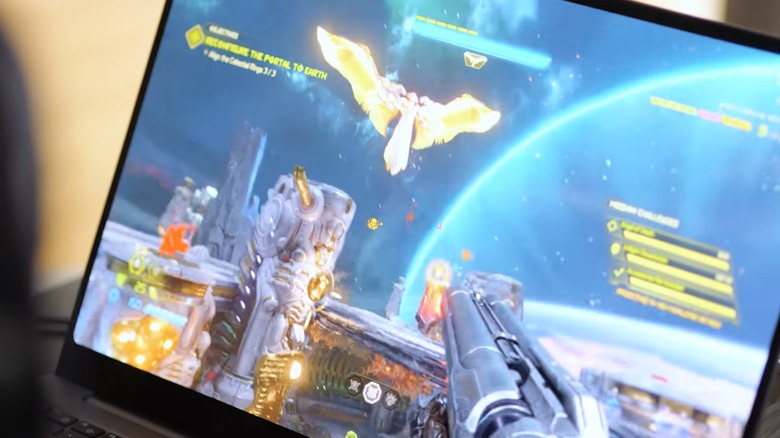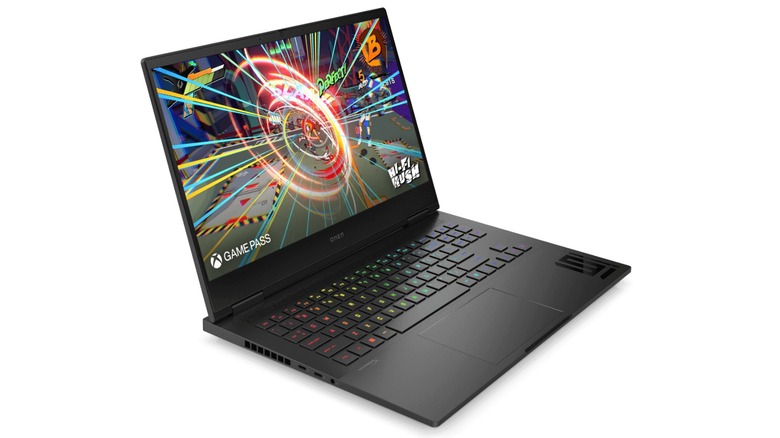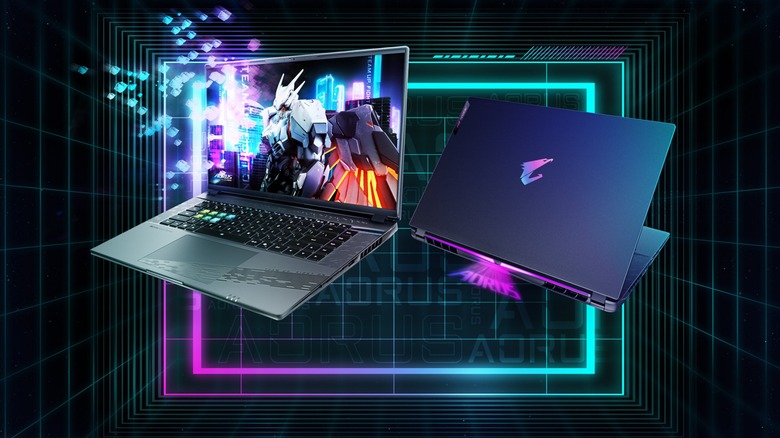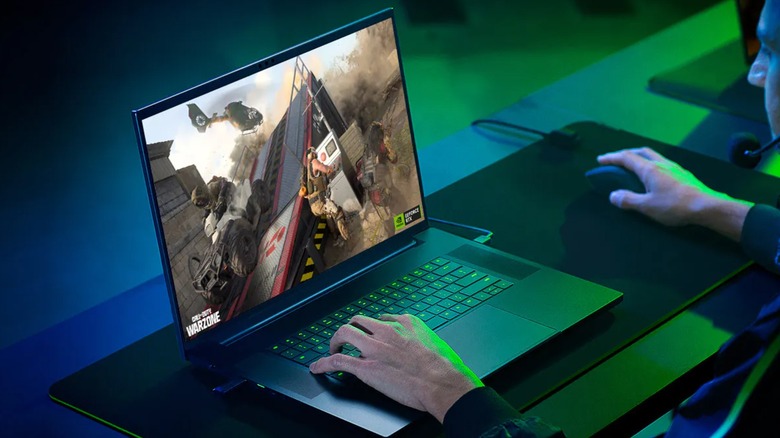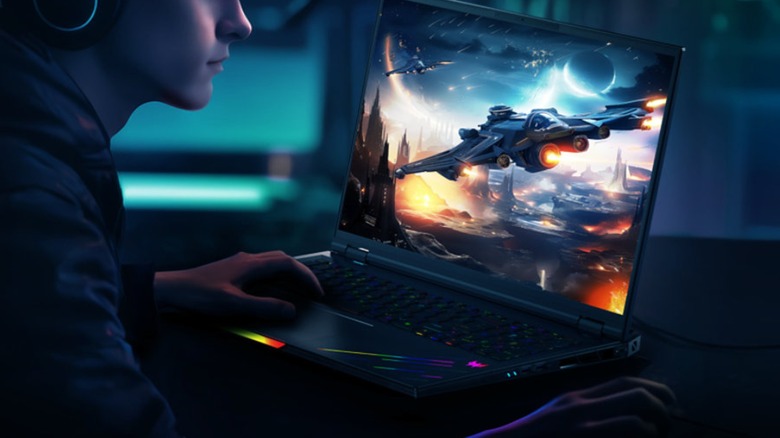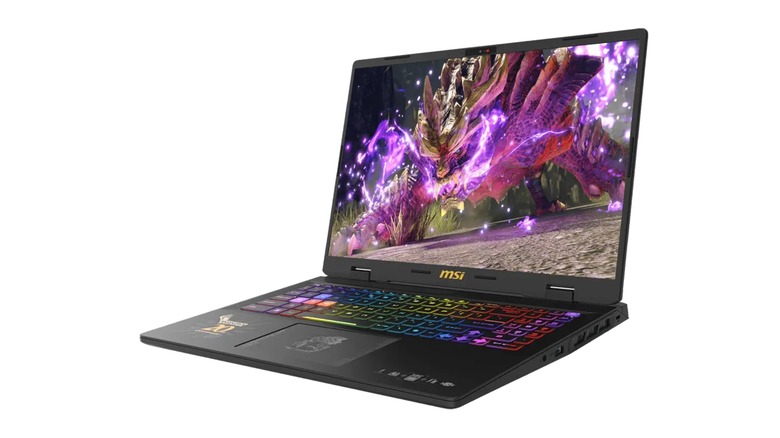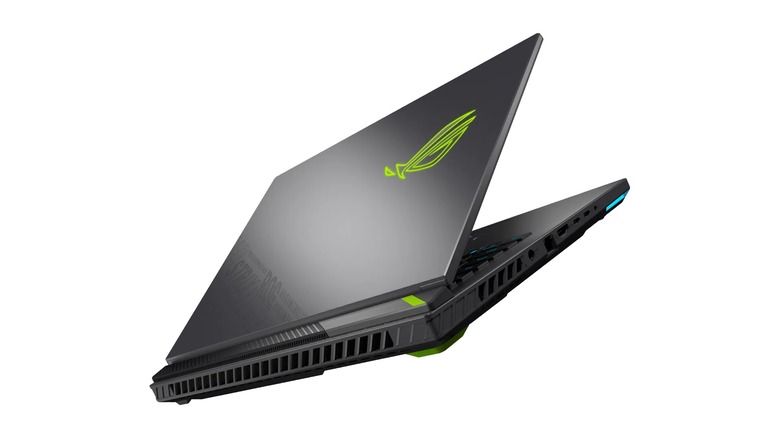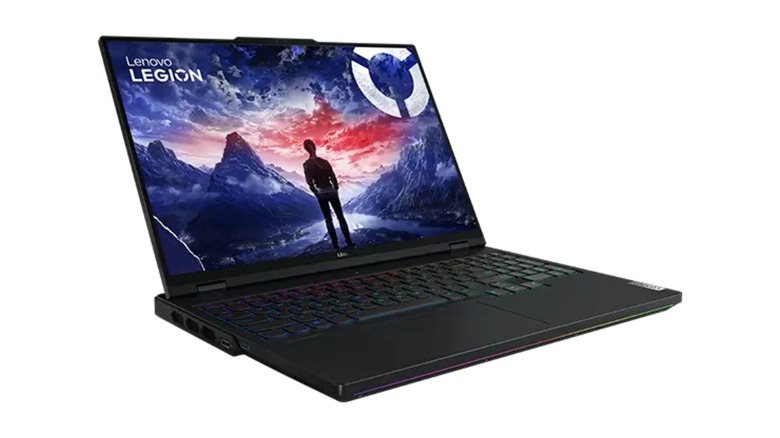Every Major Gaming Laptop Brand Ranked Worst To Best
We may receive a commission on purchases made from links.
Playing video games on modern consoles can be summed up with one simple question: Do you want a PlayStation 5, Xbox Series X/S, or Nintendo Switch? Unless you have a hankering for titles exclusive to these respective platforms, you can't go wrong with any choice. However, playing games on computers, especially laptops, is a completely different experience.
Unlike consoles, the gaming PC market is flush with manufacturers, each of which offers a bevy of products. Moreover, while every copy of a particular console includes the same graphics card, RAM, and storage drive (with the exception of devices like the Xbox Series S and the PlayStation 5 Pro), computer specs and prices vary wildly. Even when two computers from different manufacturers boast the same hardware, one often outpaces the other thanks to differences such as build quality, materials, and internal cooling systems.
This article will help you sift through the computer brands and determine which devices are worth supporting, ranked from worst to best. In the spirit of fairness, there is no such thing as an objectively bad gaming computer or laptop, let alone a bad brand. A computer with high specs from a lower-ranked brand is going to play games at higher frame rates than a computer with lower specs from a higher-ranked brand simply because it has stronger components.
Remember that a PC brand's ranking is the product of numerous factors; game performance is only one of them.
What Defines a Gaming Laptop?
Every video game console is designed to play video games. Sure, you can stream the latest Netflix and Disney+ programs on consoles, but those are tertiary features at best. You can't create Word documents on an Xbox, but you can on computers, which raises the question of what exactly is a "gaming computer" and, by extension, a "gaming laptop."
Gaming laptops are essentially laptops designed to play the latest games. Usually, manufacturers accomplish this feat by stuffing laptops full of powerful GPUs and CPUs, tons of RAM, and sizable hard drives and/or solid-state drives. Stronger GPUs and CPUs result in better framerates and graphical fidelity, and larger drives can store more games. Of course, this more powerful hardware increases the average price of a gaming laptop. Moreover, strong components generate a ton of heat while under load, so gaming laptops also need more efficient cooling and thermal dispersion solutions than the average laptop. Otherwise, the computer would cook itself or burn its owner.
Technically, you don't need a gaming laptop to play computer games. Thanks to the natural progression of computer technology, you can still play older titles on run-of-the-mill laptops. However, performance will never measure up to playing on a dedicated gaming machine.
10. Apple (MacBook Pro M)
Apple products are synonymous with many things. Video games are not among them. You can play some titles on iPhones and MacBooks, but Apple lags behind other brands in the gaming department because the company doesn't provide many dedicated gaming options.
Apple's MacBook Pro M computers are currently the closest the company has to a proper gaming laptop. For instance, the MacBook Pro M3 Max can play "Baldur's Gate 3" at max settings with a smooth 50 FPS and no slowdown (via Tom's Guide). This performance is actually better than what you get with an Nvidia RTX 4090 laptop GPU at max settings (via Notebookcheck), but that's not actually good news.
In actuality, the Pro M only outperforms other gaming laptops in "Baldur's Gate 3" because the game was optimized for Apple Silicon chips. Playing any game that isn't optimized for this processor is a roll of the dice. Titles such as "Red Dead Redemption 2" and "Elden Ring" are incompatible with Apple Silicon. Every now and then, a game receives an Apple Silicon compatibility patch after release ("Cyberpunk 2077" will in 2025), but these are exceptions that prove the rule. MacBooks aren't optimal gaming platforms since owners are locked out of most games. Also, Apple MacBook Pro Ms are hard on the wallet.
9. Dell/Alienware (G Series, M Series, X Series)
Gaming computers and laptops usually deliver superior gaming experiences when compared to consoles, but computers are also more prone to failure. What good is a powerful laptop if it is attached to abysmal customer service?
Dell computers are common in offices, and the company also dabbles in gaming. However, the company's proprietary brand of gaming laptops, the G Series, leaves a lot to be desired. Models such as the G15 are outclassed by competitors in performance and weight (via PCMag). However, Dell also sells a premium line of gaming PCs, the legendary Alienware. Where G Series laptops sink, Alienware's M and X Series soar. Reviews praise the build quality, display resolution, and game performance of laptops such as the m18 (again via. PCMag).
If I were to judge Alienware computers on their own, they would have placed higher on this list. Unfortunately, since the brand is a subsidiary of Dell, their laptops are held back by Dell's legendarily abysmal customer service. Customers who witness it firsthand tend to swear off all Dell products in the future, and the horror stories people tell of their experiences are enough to send potential Alienware owners running in the direction of rival gaming laptop brands. The quality of Alienware laptops cannot be denied, but if anything happens to either of them or G Series laptops, good luck repairing your computer in a timely manner.
8. Samsung (Galaxy Book)
Samsung's Galaxy line of products includes quite a few standout entries. The S24 Ultra, for instance, is a beast of a phone, slightly held back by its price and AI functions. However, this level of excellence doesn't extend to Samsung's gaming laptops.
Samsung's Galaxy Book line of computers comes at different points of entry. While most, if not all, can play older games, only the "Book4 Ultra" variant can be considered a gaming PC because it uses a dedicated Intel Core CPU and an NVIDIA GeForce RTX GPU (the rest rely on Snapdragon X chips). Admittedly, the Samsung Galaxy Book4 Ultra can play plenty of modern titles thanks to its components, but frugality plays just as big a role in PC gaming as a device's performance.
Several factors hold Samsung's gaming laptops back, such as the presence of annoying bloatware (via PCGamer). However, the Book4 Ultra's most egregious issue is its price. Not every model breaks the bank, but you can almost always buy a less expensive gaming laptop from another manufacturer that either matches or surpasses the Book4 Ultra's performance (via ShortCircuit). The Samsung Galaxy Book4 Ultra isn't an objectively bad laptop; it's just that almost every other gaming laptop on the market provides more bang for your buck.
7. HP (Omen, Victus)
HP computers are mostly reliable. They are not the best, but they are far from the worst. The same could be said for HP's gaming laptops...is what I would be saying if some models didn't exhibit deleterious design choices.
HP has two gaming laptop lines: the Victus and the much more popular (and advertised) Omen. While the Victus is an ok midrange laptop, people tend to think of the Omen when asked about HP's gaming laptops for a good reason. The HP Omen 16 is a powerful computer held back by a low-resolution webcam and a "mushy touchpad" (via Tom's Hardware). However, these aren't exactly dealbreakers since most PC gamers never use touchpads for gaming.
While HP's larger Omen laptops are excellent machines, their smaller brethren have some design issues. To make 14-inch Omens more portable, HP hampered their performance with underpowered components. However, the battery life is bad despite these cutbacks (again via Tom's Hardware). In fact, power concerns plague the 14-inch Omens, as their power supply is limited to 60 watts and runs on a USB-C port. This design limits the amount of electricity the CPU and GPU receive, rubbernecking game performance. No matter what graphics card HP puts in a smaller Omen, laptops with beefier power supplies will always get more oomph out of them. It's a big deal if you buy an Omen 16, but it does a great job of convincing customers in need of 14-inch laptops to purchase from other manufacturers.
6. Gigabyte (Aorus, Aero, G Series)
Gigabyte Technology is known for producing motherboards and graphics cards. Their fingerprints are found in AMD, Intel, Origin PC, and Alienware products. Gigabyte also manufactures its own gaming laptops that almost hold their own against more popular brands.
Gigabyte's gaming laptops mainly consist of the Aero and Aorus lines, both of which cater towards PC gamers on a budget. Most Aero and Aorus computers sell for south of $2,000, but these prices don't impact performance too much. 2024's Gigabyte Aorus 16X, for instance, stays cool under high gaming loads while maintaining smooth frame rates (via Jarrod's Tech). Even Gigabyte's lesser-known gaming laptop brand, the G Series, punches above its weight class in terms of game performance, even though the computer sacrifices aesthetics and audio to do so (via PCWorld).
Given Gigabyte's performance, you might wonder why the brand isn't any higher on this list. When testing the Aorus 16X's battery life, Jarrod's Tech couldn't play any games, not even when they reduced the settings of titles like "The Witcher 3: Wild Hunt" to medium. The laptop's RTX 4070 GPU breezes past the title's requirements, but because of energy conservation systems that kick in when the Aorus 16X is on battery power, the computer couldn't even manage 10 FPS. Meanwhile, 2023's Gigabyte 17X played the game just fine when unplugged. Even if you prefer to play games while your laptop is plugged in, the inability to play titles on battery power is disappointing, bordering on concerning.
5. Razer (Blade)
Razer is an entrenched name in the world of PC gaming peripherals. The company has manufactured workhorse gaming keyboards such as the BlackWidow V4 and sleek gaming mice like the Cobra Pro. Razer also sells its own gaming computers, which follow the same design principles as the rest of its products for good and bad.
Razer's proprietary line of laptops, the Razer Blades, has a history of pleasing customers. One of the brand's first laptops, which released in 2018, was an ultraportable gaming beast with some admittedly annoyingly loud fans, but the designers have refined their craft. 2024's Razer Blade 16 boasts a beautiful OLED screen and an excellent cooling system (via PCGamer). Of course, the Razer Blade comes with Razer Synapse, an app that lets users customize the keybinds and RGB lighting of their Razer peripherals. Anyone already invested in Razer products will get even more use out of a Razer Blade.
Razer Blades are excellent machines for their price, but their biggest flaw is their prices. Currently, Razer's cheapest model, a 14-inch laptop with an RTX 4070 laptop GPU, starts at $2,199, whereas the premium 18-inch model that boasts an RTX 4090 laptop GPU costs a monolithic $3,799. When you buy Razer products, you are paying for quality, but by that same token, there's no such thing as a budget Razer device, Razer Blades included.
4. Acer (Predator Helios, Nitro V, Predator Triton)
Acer is a well-established brand, especially in Asia, that manufactures computers for all sorts of niches. In the past, Acer was regarded as a budget brand selling cheap, semi-random-quality computers. The company has made strides to improve its products, but its gaming laptops still have a few issues.
Acer's gaming laptop offerings consist of the Predator Helios, Nitro, and Predator Triton computers, all of which provide a ton of power for a reasonable amount of cash. Of course, the more expensive ones are more powerful, but if you buy an Acer Helios Neo 16 with, say, an NVIDIA GeForce RTX 4070, you're purchasing one of the best experiences you can get out of a 4070. According to tests performed by Jarrod's Tech, only gaming laptops that utilized an RTX 4080 or 4090 outpaced the Helios Neo 16.
Unfortunately, a few trifling issues hold Acer laptops back from true greatness. For instance, the computer's fans are extremely loud – Jarrod's Tech placed them at a max of 60 dB, which is as loud as a conversation. Moreover, battery life is all over the place for the Acer brand. While the Predator Triton Neo 16 can last as much as 10 hours while playing YouTube videos (via PCMag), the Predator Helios 16 doesn't even last half that. However, if you're a gamer who keeps their laptops plugged in and always uses headphones, these shouldn't be an issue.
3. MSI (Titan, Raider, Stealth, Vector, Crosshair, Cyborg)
Micro-Star Interactive, better known as MSI, is a computer hardware juggernaut. The company manufactures countless components that can build powerful custom PCs, but it's also responsible for some of the most reliable gaming computers on the market.
MSI's selection of gaming laptops, and by extension PCs, are a popular choice among gamers. The company sells a wide variety of mobile computers that cater to different needs and wallets, ranging from budget-oriented machines like the Crosshair and Cyborg to titanic powerhouses such as the Titan. Plus, every laptop is decked out in stylish black and red and adorned with the MSI logo of a dragon. The laptops' fans and vents are also reminiscent of fighter jet intakes, which is always a plus.
When it comes to performance, MSI is extremely reliable, but the company has produced the occasional lemon. PCMag hailed the Titan 18 HX as a laptop capable of replacing gaming desktop PCs, even though the 18 HX sacrifices battery life and ease of portability to achieve this feat. On the other side of the spectrum, PCMag also praised the MSI Cyborg 15 for being a reliable budget gaming laptop, despite not having a ton of teraflops. However, according to the same outlet, the MSI Raider GE68HX 13VF doesn't live up to its potential due to a cramped keyboard and a substandard screen. Still, MSI computers more often than not blow most of the competition away.
2. ASUS ROG/TUF (Flow, Zephyrus, Strix, A Series)
MSI and ASUS are often regarded as the best gaming PCs and laptops available. Picking between them is mostly apples and oranges, but there are reasons to buy one over the other.
Nine times out of ten, ASUS' gaming laptops, ASUS ROG and the slightly more budget-friendly ASUS TUF, are every bit as capable as their MSI rivals. The ASUS ROG Zephyrus G14, for instance, manages to cram up to a beefy RTX 4070 and an OLED screen into a chassis almost as wafer-thin as the MacBook Air. Meanwhile, the ASUS ROG Strix G16 boasts a mighty hardware configuration, but unlike the smaller Zephyrus, the Strix G16 doesn't have optimally arranged ports (via PCWorld). Furthermore, both computers have relatively short battery lives, but that's a common issue among gaming laptops.
Ultimately, you can't go wrong with either ASUS or MSI. Both brands have a history of delivering excellent gaming performance, so why is ASUS higher on this list? It mostly comes down to price. While the most powerful ASUS ROG computer can't measure up to the most powerful MSI laptop, ASUS makes up the difference by being affordable across the board. Depending on where you shop, you will probably spend more on an MSI gaming computer than on an equivalent ASUS. The occasional sale might make these price differences negligible, but otherwise, an ASUS is a more frugal option.
1. Lenovo (Legion, LOQ)
Several years ago, Lenovo didn't have much of a gaming laptop presence. Their computers were popular, just not built for gaming. Then, out of nowhere, Lenovo entered the gaming market and blew the competition away, including more established brands.
The Lenovo Legion brand released in 2017 and took the PC gaming world by storm thanks to laptops that punch well above their weight class. Take the Lenovo Legion 5i. This laptop's CPU and GPU are far more powerful than its mid-range price would imply, and these components are backed up by a hefty 16-inch display (via TechRadar). But if you need pure power, look no further than the Lenovo Legion 9i. While expensive, this computer fits an NVIDIA GeForce RTX 4090, the most powerful laptop GPU prior to 2025, into a thin and light frame. Yet despite this design choice, the computer stays cool under pressure thanks to a liquid cooling system.
Lenovo also sells a budget gaming laptop brand under the name Lenovo LOQ. These computers aren't as flashy as Legion laptops and cut quite a few corners when it comes to build materials and displays, but according to reviews from outlets such as Tom's Guide, LOQs provide the same quality-to-price ratio. The ability to deliver superior game performance for less money allowed Lenovo's laptops, especially its Legion brand, to top several "Best Gaming Laptops of the Year" lists. If that isn't an endorsement of the brand's quality, I don't know what is.
Methodology
To gather these entries, I leveraged information gathered from a fairly recent laptop research marathon — I am typing this article on my new gaming laptop.
As previously established, gaming laptops can have a wide range of internal configurations. Many rankings were determined by how a brands' overall graphical fidelity and framerates compared to others', but that was only one piece of the puzzle. Price was also a major factor. Since not every gamer can spare several thousands of dollars on a computer, I favored brands that cost slightly less than their competitors without sacrificing too much performance over companies that sold powerhouses at exorbitant prices. And, of course, egregious issues that sabotaged a laptop's ability to serve as a gaming platform, such as poor customer service or a general lack of game compatibility, negatively impacted their ranking.
My personal experiences influenced the initial order of certain slides — I have owned Dell, ASUS, MSI, and Lenovo laptops. However, I am only one voice in a sea of PC gamers. The opinions of customers and critics alike were paramount in determining whether certain brands stayed in their original list positions, as well as where to place brands I have no experience with (e.g., Razer, Gigabyte).
